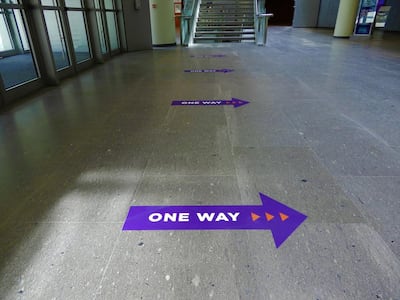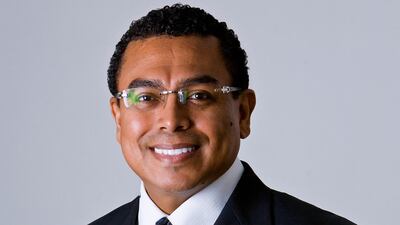The new provost of New York University Abu Dhabi said the Covid-19 pandemic was an opportunity for students to learn about strength in the face of adversity.
The pandemic has resulted in schools and universities across the world having to cope with many students learning remotely, while those who are in classrooms have to practice strict social distancing measures.
Dr Arlie Petters, who took over as provost at the university at the start of September, said he was impressed by how the students have adapted to the new measures put in place.
“They have shown great resilience even though the connections they would usually have with other students are not there right now,” said Dr Petters, who was selected for the role of provost following a nine-month global search.
“I am very proud of how they have handled it, especially in terms of continuing their studies.
“It’s a challenge for everyone but I firmly believe we will all get through it.”
He said the response from students and staff at the university had shown him the importance of human connection.
“I have been impressed by how students have been helping each other, how the staff have been working overtime and how the faculty has responded to all these variables,” he said.
“There has been a willingness to help each other that has shown me the better side of humanity.”
Restrictions of pandemic can encourage innovation
Dr Petters said there were also opportunities to explore new methods of education, which would not have been possible before the pandemic.
“We are drawing more and more on online innovations for learning,” he said.
“We also seeing the benefits of it right now in meeting the different learning styles of students in ways that would not be so easily done in an in-person classroom.
“I believe when we get back to in-person learning, whenever that might be, these elements will continue to benefit us.”
Dr Petters was 14 when left his native Belize to move to New York. He went on to secure roles at prestigious colleges including Princeton University, where he served as assistant professor of mathematics, and Massachusetts Institute of Technology (MIT) as an instructor of pure mathematics.
He also was the Benjamin Powell professor of mathematics and a professor of physics and economics at Duke University, where he had been on the faculty since 1998.
His own heritage makes him uniquely qualified to talk about the racial divisions and the resulting riots that are now commonplace in the US.
“I come from a mixed heritage, my mother is black and my father is a Mestizo,” he said.
“Belize is a small country, of about 350,000 people, but it is so diverse, I remember meeting so many people from diverse backgrounds when I was a child.
“After moving to the US I found myself having to deal with racism, I was part of a group that felt oppressed.”
Rather than become embittered, he said his experiences made him question why such divisions existed.
‘You have to ask is there a misunderstanding between people that is bridgeable,” he said.

“One positive opportunity that comes out of the protests and the pain we see in the US is it allows us all to really try and increase our capacity for empathy.
“It’s an opportunity to increase intercultural understanding.”
University leader has a global vision
That empathy and compassion are key tenets of his vision for NYU Abu Dhabi.
‘We want to foster excellence in our students so they become global citizens,” he said.
“With that comes empathy for our fellow human beings. That is among the best qualities we can offer our undergraduates, graduates and faculty.”
He said the set-up of NYU Abu Dhabi makes it perfectly positioned to be a microcosm of the world, with 115 different nationalities all learning together.
“An important part of my ethos is to create a desire to understand someone who is different from you and has a different view,” said Dr Petters.
UAE adapts in effort to overcome Covid-19:
“It’s important to be able to sit with that difference even if it makes you uncomfortable at times.”
He added that he took the role at NYU Abu Dhabi because he believed the university shared his values.
“I am drawn to an environment that promotes key human qualities, I know I will continue to grow and we will continue to be a role model for the world,” he said.
“We want to develop our capacities in ways that promote peace, cooperation and productivity in the world.”














